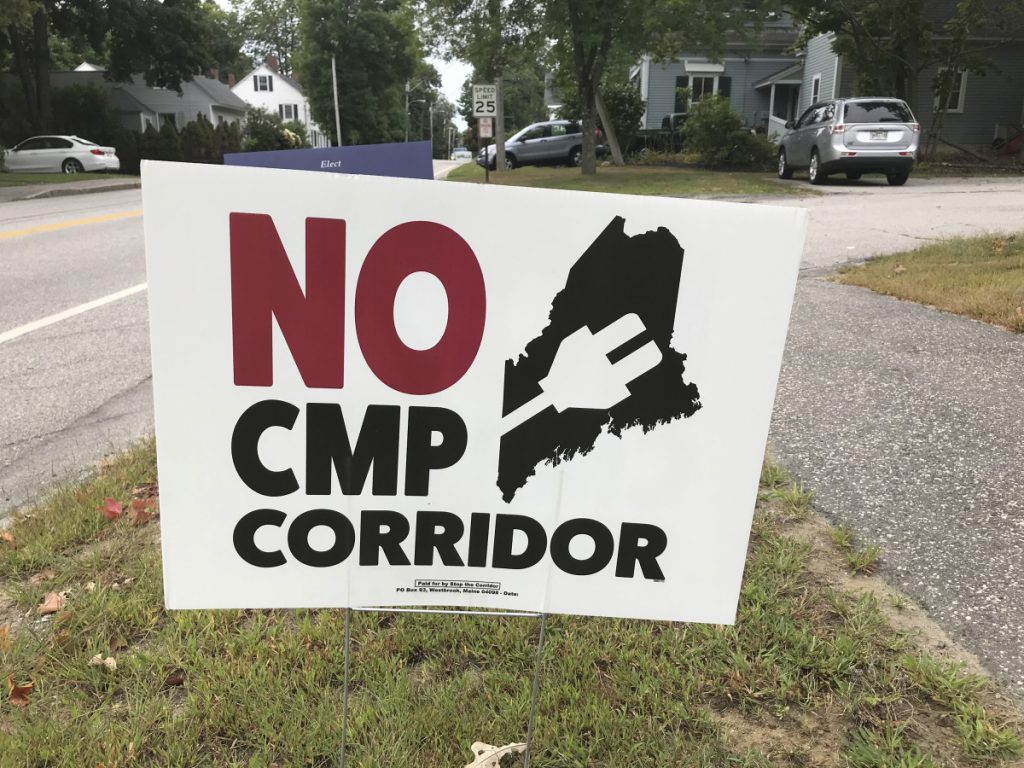Regardless of how one feels about the proposal by Central Maine Power to build a transmission line through western Maine to funnel hydropower from Quebec to Massachusetts, it raises interesting questions about Maine’s campaign finance system and its transparency. One of the project’s main opponents, an umbrella group called Stop the Corridor, is made up of environmental groups and corporations that have come together to stop the project. That’s not so unusual.
What is unusual — at least in Maine — is that for the past year or more they’ve been waging a very public campaign against the project, rather than just lobbying behind the scenes.
In fact, they’ve been behaving much like any referendum campaign, except that they don’t have anything on the ballot to advocate for or against. They’re essentially running a political campaign without a candidate or a ballot question, and because of that they fall between the cracks of our campaign finance laws. They don’t have to file campaign finance reports or reveal the size of their donations, the identity of their donors or how they spend their money. They’re running what appears to be a massive public pressure campaign, but we have no idea who they’ve hired as consultants, how much they’re spending on ads, or much of anything else.
This is a shame, because part of judging the fairness and accuracy of any campaign is taking a look at the source of its finances. We do it all the time with politicians (whether it’s fair or not) as well as with referendum campaigns.
During the most recent campaign to expand casino gaming in Maine, for example, it was pretty clear that the entire effort was a get-richer-quick scheme by Shawn Scott. That was made especially clear when one examined the campaign’s financing, which revealed that the donations came from Scott and his buddies. If those financial connections hadn’t been clear, it might have been much easier for proponents to paint the project in a positive light.
Similarly, we ought to be able to delve into the complete finances of Stop the Corridor. The money for the campaign could be coming from competing energy companies or other corporate interests that would benefit financially from killing the project. If that were the case, it would be worthwhile to know, just as we know that CMP and its parent company, Avangrid/Iberdrola, will make money from the line being built.
Stop the Corridor isn’t the only group in Maine politics ducking transparency. There are a whole host of political nonprofits in Maine that don’t have to reveal who their donors are or how much they give, nor do they have to say how much they spend. Theoretically, they can’t engage directly in electioneering, but often their so-called “educational” ads look and feel just like political attack ads, such as the one run by Stop the Corridor critical of Gov. Janet Mills for supporting the CMP proposal.
Ideally, all of these political nonprofits would be required to disclose the source of their funding, so we could judge for ourselves the value of their initiatives. Given the political and legal hurdles to enacting such a law, that’s not likely to happen any time soon.
But there’s nothing to keep the political nonprofits or groups like Stop the Corridor from being honest about the source of their funding. In the case of Stop the Corridor, which doesn’t even have to follow the state and federal financial laws that political nonprofits do, their unwillingness to embrace transparency is a perfectly good reason to question their motives and ask what, exactly, it is they are hiding.
These groups aren’t the only ones in politics who are less than transparent. When a political consultant works for a political candidate, a campaign, a political party or a political action committee, we are able to see who they’re working for and exactly how much they get paid. These guys don’t just take eight or 10 months off in between elections, though — they frequently have corporate clients, advising them politically and helping to wage their public relations battles. When they engage in that kind of work, we can’t connect the dots between their corporate clients and their political ones — which can be vital information.
Regardless of how we feel about an issue, we ought to demand transparency and accountability in our political discourse. All of us deserve to know where the money in our politics is coming from and how it’s getting there. If we don’t have that information, it’s impossible to have an honest debate.
Jim Fossel, a conservative activist from Gardiner, worked for Sen. Susan Collins. He can be contacted at: jwfossel@gmail.com
Send questions/comments to the editors.



Comments are no longer available on this story